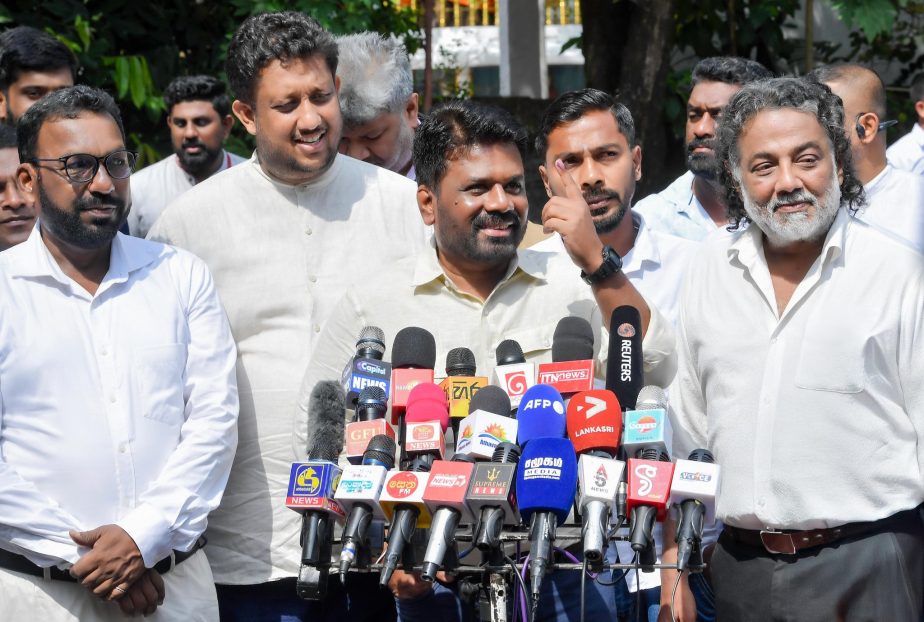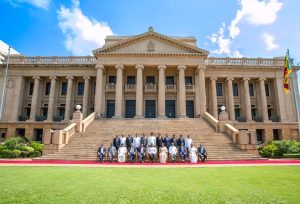Sri Lankan voters have given an emphatic mandate to the leftist Janata Vimukthi Peramuna (JVP)-led National People’s Power (NPP) coalition. Seven weeks after the coalition’s Anura Kumara Dissanayake won the presidential election, it won a sweeping victory in parliamentary elections, snagging 159 out of 225 total seats. The result is historic; no party has won a two-thirds majority since the proportional representation system was introduced in 1978. Moreover, the JVP/NPP has won seats in the Tamil-dominated Northern Province.
Will Sri Lanka’s new government use its parliamentary majority to abolish the powerful executive presidency or to devolve more powers to the provinces?
S.I. Keethaponcalan, professor of Conflict Resolution at Salisbury University in Maryland, and author of “Electoral Politics in Sri Lanka: Presidential Elections, Manipulation and Democracy,” (2022: Routledge) is adopting a wait-and-see approach. In an interview with The Diplomat’s South Asia editor Sudha Ramachandran, Keethaponcalan said that given the JVP’s deeply embedded Sinhala nationalist ideology, he did not “expect any moves from the government to address the Tamil question.” Rather, “it will try to develop a common Sri Lankan identity and expect the Tamils to shed their identity politics.”
The JVP, the core of Sri Lanka’s new government, has a violent past. Could you briefly share your insights into its ideology and how its role in Sri Lankan politics has changed over the decades?
First, the difference between the JVP and the NPP is not clear. Some believe that the NPP is a broad coalition headed by the JVP, while others believe that the JVP and NPP are the same. If the JVP and NPP are different, the core of the NPP is the JVP. Many leading members of the JVP or the old guard have entered parliament now through the NPP.
Regarding the JVP’s history, it was formed by Rohana Wijeweera in 1965 to forcefully overthrow the government and establish a Marxist-socialist state. It staged its first insurgency in 1971, only to be violently crushed by the Sirimavo Bandaranaike government. Wijeweera was sent to prison with his followers. President J.R Jayawardene freed Wijeweera, who contested the 1982 presidential election. Following the 1983 anti-Tamil riots, the JVP was banned, and the organization went underground only to come out for its second insurgency in the late 1980s. The second insurgency caused a lot of violence and deaths. President Premadasa unleashed a ruthless campaign against the JVP and its supporters. This campaign eventually killed Wijeweera and all other leaders of the JVP. The only survivor was Somavansa Amarasinghe.
Under Amarasinghe’s leadership, the movement transformed into a political party and entered parliament in 1994. However, the party continued with its Marxist-socialist ideology. I have not seen any evidence to suggest that the party has given up its socialist ideals. The party constitution states it is a Marxist-socialist party and its home page still carries the images of Wijeweera and the symbol of hammer and sickle. I think the party still believes in socialist ideals. The question is, how would the party adjust to the new realities of Sri Lankan politics?
The JVP/NPP has won a two-thirds majority in the parliamentary elections. This is unprecedented in Sri Lanka. To what do you attribute this historic performance?
President Dissanayake has been in parliament since the year 2000. However, the party could not win any significant support until this year. In the last parliament, it had only three members. I think the unprecedented win in this election could be easily called a peaceful coup by the voters.
The victory could be attributed to several reasons. One, voters were disappointed and frustrated with the political parties and leaders who held power so far. They blame these political parties for the economic crisis of 2022 because they view corruption as the primary cause of the crisis. Therefore, this was an opportunity to reject all or most of them altogether. The flip side of this argument is that Sri Lankan voters do not take any responsibility for what happened in 2022, even though they constantly voted for known corrupt officials and abusers of power.
Two, Sri Lankan voters seem to be yearning for a new beginning, and the JVP offered a clean and corruptionless program. It appears that the voters believe that the JVP/NPP government will clean the system and establish a government founded on the philosophies of citizens’ welfare. One must wait and see because corruption is a deeply rooted problem in Sri Lanka. The hope is that Sri Lanka has not elected a new cohort of corrupt politicians.
Three, there are no alternatives. The opposition parties are weak and lack credibility. For example, the election campaign of the Samagi Jana Balawegaya (SJB) from its inception seemed feeble. The party members also exposed the weakness by saying they wanted to form a strong opposition. In other words, they conceded even before the election. Former President Ranil Wickremesinghe did not have credibility, especially within the nationalist segment of the Sinhala polity, despite his ability to stabilize the economy and the country since the economic crisis. The low voter turnout also contributed to the eventual numbers.
However, I must admit that I was surprised by the level of support the JVP/NPP received, winning 159 seats in the 225-seat parliament. I expected it to win a simple majority. This is overwhelming.
This is the first time that a Sinhalese party has won in Jaffna, the capital of the Tamil-dominated Northern Province. How do you think the JVP/NPP government will respond to this mandate?
The most surprising element of this election was the votes and seats the JVP/NPP gained in the Northern Province. Many Muslim electors voted for the JVP/NPP candidate in the presidential election. But the Tamils preferred Wickremesinghe, Sajith Premadasa of the SJB, and the common Tamil candidate Ariyanendran in the presidential election. Therefore, the expectation was that the Tamil voters in the north would vote for Tamil parties and SJB in the parliamentary election.
The Tamil voters’ rejection of the Tamil parties, especially the Ilankai Tamil Arasu Katchi (ITAK) was astounding. This should be a rude awakening to the ITAK and other Tamil parties. The way the ITAK was operating recently indicated that the demise is not too far away. The party is in disarray.
I don’t know how the JVP/NPP would respond to the mandate. I believe the new government would offer economic incentives, which the Tamils have rejected in the past. However, due to its ideological foundation and the possible Sinhala backlash, I don’t expect the government to provide any political relief or political rights to the Tamils. The Tamil voters could also have a rude awakening.

President Anura Kumara Dissanayake shows his inked finger to the media after casting his vote in the general election at the Saikoji Preschool polling center, in Panchikawatta, Sri Lanka, Nov. 14, 2024. Source: X/ President’s Media Division of Sri Lanka – PMD
How is the new government likely to use its two-thirds majority?
One of the party’s presidential election promises was to reform the constitution to abolish the presidential system and reintroduce the Westminster form of government. This promise was part of its election manifesto. Now, the party has the necessary parliamentary majority to amend the constitution. Therefore, ideally, it should reform the constitution and reintroduce the Westminster form of government. However, returning to the old system will not be easy as the nationalist segment of the Sinhala polity believes that the executive presidential system is necessary to protect the unitary structure of the state. Therefore, this will be a challenging task. One must wait and see how the government handles the issue of constitutional change.
There are some similarities between the 2019-2020 elections and this year’s elections. In 2019, the voters elected Gotabaya Rajapaksa, an idealist — he thought he could transform Sri Lanka into a fully organic farming system overnight — but who had no governance experience, and in 2020, they gave him a two-thirds majority in parliament. That decision ended in disaster.
President Dissanayake is a socialism-oriented idealist with no governance experience. Now, the voters have given him a two-thirds majority. I hope the JVP/NPP has learned enough lessons from the Gotabaya experience, or rather experiment.
The JVP has a long history of anti-Tamil, Sinhala chauvinist politics. How is it likely to tackle the Tamil national question?
I am surprised by the support the party gained in the Northern and Eastern Provinces, mainly because of its anti-Tamil politics. The JVP opposed every concession previous governments proposed to solve the ethnic conflict. If I remember correctly, the agreement the JVP signed to save President Chandrika Kumaratunga’s government in 2001 had a provision preventing any form of devolution of power. As you pointed out, the party has a long history of chauvinistic politics. I don’t believe that it has suddenly been cleansed. These philosophies, perhaps, are embedded deeply in the psyche of the current leaders. Therefore, I don’t expect any moves from the government to address the Tamil question. Instead, it will try to develop a common Sri Lankan identity and expect the Tamils to shed their identity politics.
I would be happy if the government did not take away some of the political concessions gained already. For example, I hope it does not try to abolish the provincial council system through a constitutional amendment.
During his presidential campaign, Anura Kumara Dissanayake pledged to renegotiate with the IMF. Is this likely to happen now that parliamentary elections are over?
Renegotiating with the IMF should always be possible. The question is whether the IMF would agree to the amendments suggested by the new government. I think the IMF would not support fundamental changes to the existing agreements, especially crucial provisions for economic stabilization. Nevertheless, the parties may agree to several face-saving arrangements.
What is the new government’s foreign policy likely to look like?
The government’s foreign policy outlook is not clear. Like the previous government, the new administration may try to balance relations with significant international players, including India, China, the United States, and the European states. However, I think a new space has been created for China’s reassertion in Sri Lanka.
During the war with the LTTE, the Rajapaksa government worked closely with India because the government knew that the LTTE could not be controlled without Indian assistance. India greatly assisted the Sri Lankan government in terminating the LTTE in 2009. However, after the end of the war, the Rajapaksa government, sidelining India, leaned drastically towards China. At one point, Sri Lanka looked like a Chinese colony.
The economic crisis of 2022 changed everything. The crisis allowed India to restabilize its position in Sri Lanka through immediate assistance. India provided about $4.5 billion worth of aid through credit lines, humanitarian assistance, and donations. China was marginalized partly because it refused to restructure Sri Lanka’s debt servicing.
Now, with the election of JVP/NPP, China has found a space to reenter. I believe that, as a socialist political entity, the JVP has a soft corner for China. One cannot also underestimate the JVP’s virulent anti-India campaign of the late 1980s. Therefore, China should be happy about the election results. In other words, the election results would reignite the great power competition in Sri Lanka.

































